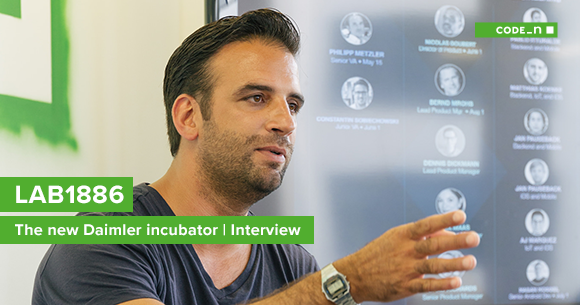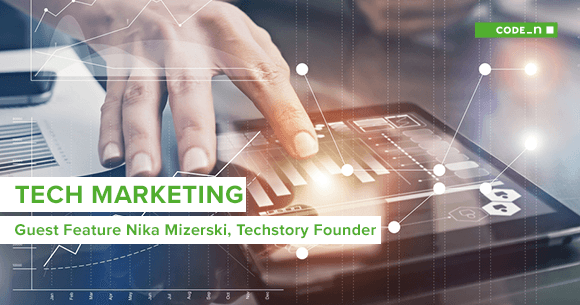“The automotive industry is about to undergo the biggest change in its history.” Matin Ebrahimchel of Lab1886, the Daimler incubator
Something big is a-happenin’ in CODE_n SPACES. For a number of months now, there’s been an “innovation team with a difference” pacing the corridors of the campus in Stuttgart. This year marked the launch of the new Daimler incubator Lab1886, which chose CODE_n SPACES as the premises for its fourth site, aside from Berlin, China, and the United States. The “global innovation machinery” – as it likes to call itself – was already announced at the GFT Inspiration Day (see here for our write-up). Matin Ebrahimchel, CEO of LAB1886 GmbH, joined us for an interview on the new incubator and the underlying initiative.

Lisa: Hi Matin, you were in charge of IT Connectivity Daimler Trucks and now you and your team have moved into CODE_n SPACES with Lab1886 – “The Incubator of Daimler AG.” Welcome once again to the CODE_n family! Just give us a quick explanation of the mission you’re pursuing.
Matin: Our remit is to develop new business models for Daimler and if required launch our own business venture. We currently have Lab1886 operating through four sites, in the US, Beijing, Berlin, and here in Stuttgart.
Lisa: What would it be like watching your everyday work? Could you give us a couple of examples of the sort of projects you’re involved in?
Matin: We’re currently working on a number of projects but unfortunately I’m not allowed to tell you too much about them at the moment. But I can tell you that we’re working in collaboration with a number of different areas within Daimler. Also, one thing we’ve discovered in the last couple of months is that there’s strong demand for our skills. One reason we’re noticing this is that we’re really busy at the moment.
Lisa: What does Lab1886 add to other innovation initiatives at a big company like Daimler?
Matin: It’s great to see such a large number of innovation initiatives springing up at our company. It shows that Daimler takes the challenge seriously and is willing to tackle it. Lots of people have understood that the automotive industry is about to undergo the biggest change in its history. But as a corporation, you have to put the right things in place to be in a position to react to this change. And that’s what’s happening at Daimler. At Lab1886 we’re THE incubator for the company and our work on new business models transcends all divisions and areas of the corporation. That means we’re just as busy delivering projects in trucks as we are in HR, buses, AMG, and even the Formula 1 team.
Lisa: How do promising new ideas land in your in-tray at the incubator? How are they assessed and selected?
Matin: Either the ideas come from the over 280,000 people working worldwide at the company, or they come directly from the specialist departments. The first thing that happens with an idea is that it goes through a so-called validation phase. To do this, we check a variety of criteria, such as whether the idea is on the market already, what the competition is up to, can it be implemented in technical terms, is the idea a good fit with Daimler, etc. This phase takes three to seven weeks, and if something positive comes out of the other end we progress the idea to the so-called shark tank. This is a committee, with a high-end jury of top managers and board members from Daimler, plus external experts and the works council. The people who came up with the idea pitch their concept to the committee and if the shark tank gives its nod of approval for the project, it’s literally pushed over to the incubator and we start working on it together with our experts to develop the idea into a business model.
Lisa: What methods do you use when you’re developing an idea? And in what ways are these methods different from the approach you used to take as a corporation?
Matin: The structures and skills you need to put things in place for a new venture, within a matter of months, are fundamentally different from the ones you need to develop or produce vehicles. This means at Lab1886 we have to use expertise and ultra-efficient working methods from the world of startups. That’s why we consciously decided to operate as a separate legal entity to bring precisely those kinds of experts on board.
Lisa: Your team has been a resident of CODE_n SPACES since March 2017 and there’s another team in Berlin. Why did you decide to come to SPACES, and how do the different sites work together?
Matin: For me, Berlin is the most vibrant city in Europe when it comes to the startup culture. There are an unbelievable number of things going on and it’s incredibly fast-moving. As a result, there are a multitude of really good and appealing co-working spaces. The beat’s a bit slower in Stuttgart and to be honest, CODE_n SPACES was one of the few alternatives in the telephone book with the right kind of spirit for us. It’s adaptable and uncomplicated, and it’s a creative setting with a top team. We feel really at home here.
Lisa: What are the next steps for Lab1886 and what would your advice be for other companies planning to use an incubator?
Matin: We’re right in the middle of the ramp-up phase of our enterprise. This will still keep us occupied for a while. Recruitment will be a bit of a challenge for us, especially in Stuttgart. Some advice? I think it all depends on the company. But as a rule, the company has to be prepared to change itself. That sounds easier than it actually is. Also, you can’t get anything done without the right people. You need a team of experts to hit high speeds and top quality, and provide the deliverables that are expected of you as an incubator.
Lisa: Thanks for that Matin, and thanks for answering the questions for our readers! Of course we’ll stay in touch and we look forward to our next little talk – maybe next time we can talk over a game of foosball or over a coffee in the lounge ;).





Write a comment